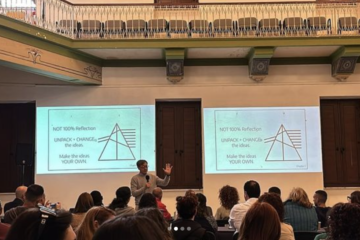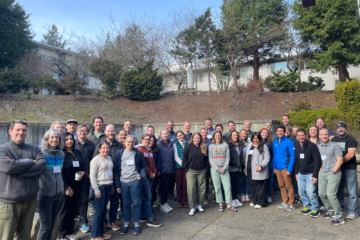After two years of meeting virtually, the International Commission on Jesuit Education (ICAJE) finally met face-to-face in Rome from May 17th to the 20th. The meeting was organized by Jose Alberto Mesa SJ, who heads the Society’s Secretariat for Secondary and Pre-Secondary Education. With the exception of Raimundo Barros SJ, President of FLACSI, all the regional delegates made it to the Jesuit Curia: Joe Arimoso SJ (Africa & Madagascar), Ms. Agnieszka Baran (Europe), Johnny Go SJ (Asia Pacific), John Ravi SJ (South Asia), and Bob Reiser SJ (North America).

Also part of the meeting were: Éamonn McGuiness, Director of Educate Magis, the representatives of JRS Education and Fe Y Alegria, Eric Velandria SJ and Marco Gómez SJ, respectively. Joining us from the Secretariat were Sunny Jacob SJ, Assistant for Faith Formation and Felipe Carrillo, Assistant for Special Projects. Being the FLACSI Executive Secretary, Felipe reported on the Latin American schools on behalf of Bro. Raimundo.
The agenda was full, beginning with the annual updates from the regional delegates. This year, however, the delegates were requested particularly to report on the impact of the Coronavirus Pandemic on the schools in their regions. While school heads and teachers around the world showed equally heroic efforts in responding to the pandemic, it was also clear that due to differences in resources, some schools suffered greater disruption than others, leading to more learning deficits and greater social costs among the students. This was particularly true in JRS and Fe y Alegria.
The group also discussed the impact of last year’s fully virtual II Colloquium JESEDU-Global2021, which had been organized by Asia Pacific. The group agreed that more could be done in the different regions, especially in relation to what many regarded as the heart of the colloquium–the Discernment Circles, where in small mixed groups, educators shared and prayerfully listened to one another’s experiences and insights in light of the themes of the colloquium. The Discernment Circles provided the participants with a concrete and powerful experience of the global network.

The delegates also discussed the way the implementation of the integrated holistic perspective on Jesuit education was going in their respective regions and how to improve their efforts in continuing the discernment of Jesuit education as a living tradition using the most recent and essential documents of the Society on its educational ministry. The global webinar series is one concrete program, and after the first on Justice last March, the second one on Love of Creation will be in June.
The delegates had the benefit of listening to two experts who provoked them into a deeper conversation about our schools’ Catholic identity and their contemporary task of faith formation: Benoit Malvaux SJ explained the canonical implications of the recent Instruction of the Congregation for Catholic Education on “The Identity of the Catholic School for a Culture of Dialogue” (29.03.2022). James Hanvey SJ, the Society’s Secretary for the Service of Faith, who provided his reflections and questions to frame the group’s conversation on the upcoming II Seminar JESEDU-Jogja2024, which will tackle the important challenge faced by Jesuit schools in faith formation: how to offer it to our students in an in-depth manner, while promoting interreligious respect and dialogue.

A central piece of the meeting was the spiritual conversation on the Catholic identity of our schools, facilitated by John Ravi SJ.
Many other topics were discussed in the course of the four-day ICAJE meeting–including an upcoming global celebration of the 50th anniversary of Fr. Arrupe’s revolutionary talk on “Men (and Women) for Others.”

As per their custom, the closing Eucharist was held in the chapel in the Rooms of St. Ignatius at the Church of the Gesu. The Mass presider, Joe Arimoso SJ, interpreted the significance of this ICAJE tradition as similar to the act of foot soldiers pledging their allegiance to their general. Representing our global network of schools, the ICAJE delegates gathered in Rome to report on their regions, to discuss possible strategies, and finally, to pledge their allegiance to St. Ignatius.

It would be an understatement to say that a lot was accomplished in those four days, but one important realization shared by those who participated in the ICAJE meeting was that ten years after the very first colloquium in Boston, the Jesuit Global Network of Schools–only recently officially launched by Fr. General Arturo Sosa SJ–was finally coming of age. In the words of the Worldwide Secretary for Secondary and Pre-Secondary Education, Jose Alberto Mesa SJ, “We are now beginning to work together and to think of working together as a global network.”


